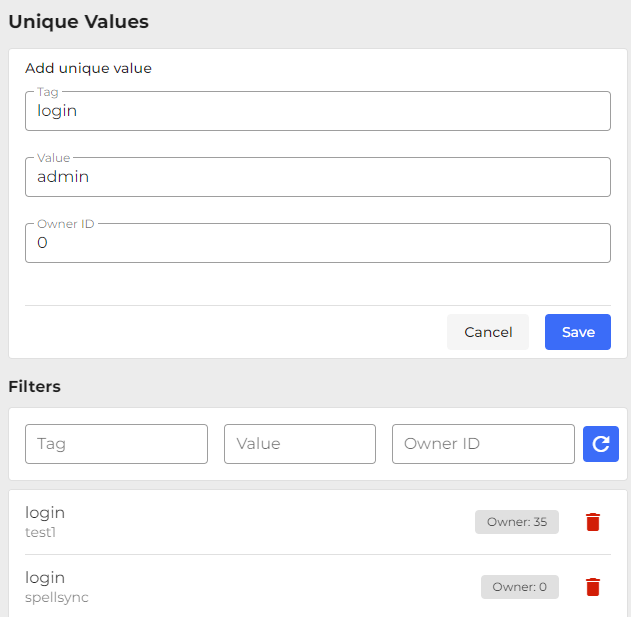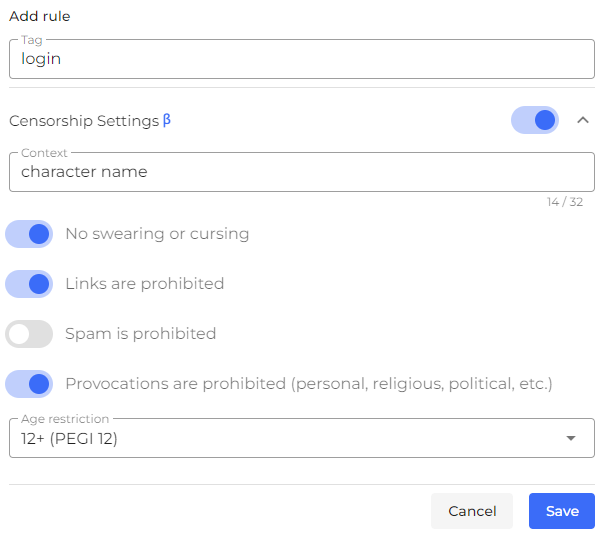Unique Values
Overview
The module allows registering unique values project-wide that are associated with a player. Only the player-owner can modify and delete the value. Once registered, no other player can have the same unique value for a specific tag.
Examples of unique values:
- Login / nickname;
- Base name / city name;
- One-of-a-kind item.
- Owner's status in a selected region.
- And much more.
Register Value
+1 RequestTo register or update a unique value, you need to pass a tag and a value.
- If the value has not been registered by the player, it will be added:
- If no one else has the same value with this tag.
- If the value already exists for the player with the same tag, it will be updated:
- If no one else has the same value with this tag.
Tag / value size should not exceed 1 KB.
- JavaScript
- Unity
// Register
ss.uniques.register({ tag: 'login', value: 'Be$t_Devel0per' });
// Update by tag
ss.uniques.register({ tag: 'login', value: 'The_Be$t_Devel0per' });
// Register
SS_Uniques.Register("login", "Be$t_Devel0per");
// Update by tag
SS_Uniques.Register("login", "The_Be$t_Devel0per");
Events upon value registration
- JavaScript
- Unity
// Successfully registered
ss.uniques.on('register', (uniqueValue) => {
// uniqueValue.tag
// uniqueValue.value
});
// Error during registration
ss.uniques.on('error:register', (error) => {});
public void Register() => SS_Uniques.Register("login", "The_Be$t_Devel0per", OnRegister, OnRegisterError);
// Successfully registered
private void OnRegister(string tag) => Debug.Log("ON REGISTER: SUCCESS: " + tag);
// Error during registration
private void OnRegisterError() => Debug.Log("ON REGISTER: ERROR");
Registration method with promises
- JavaScript
- Unity
const result = await ss.uniques.register({ tag: 'login', value: 'Be$t_Devel0per' });
/**
* Whether the registration was successful
* @type {boolean}
*/
result.success;
Not implemented
Get Value
FREE- JavaScript
- Unity
// Get
const value = ss.uniques.get('login'); // string
// Get
SS_Uniques.Get("login"); // string
List of Values
All unique values registered by the player.
FREE- JavaScript
- Unity
const values = ss.uniques.list;
SS_Uniques.List();
Example content:
[
{ tag: 'login', value: 'Be$t_Devel0per' },
{ tag: 'cityName', value: 'Crabifornia' },
{ tag: 'item', value: 'THOUSAND_TRUTHS_SWORD' },
{ tag: 'title', value: 'GAME_LORD' },
];
Check Value
+1 RequestTo check a unique value, you need to pass a tag and a value. This may be needed for real-time validation. Upon attempting to register a value, it will be checked again.
- JavaScript
- Unity
// Check
ss.uniques.check({ tag: 'login', value: 'Be$t_Devel0per' });
// Check
SS_Uniques.Check("login", "Be$t_Devel0per");
Events upon checking a value
- JavaScript
- Unity
// Checked successfully, no match found
ss.uniques.on('check', (uniqueValue) => {
// uniqueValue.tag
// uniqueValue.value
});
// Error during check
ss.uniques.on('error:check', (error) => {});
public void Check() => SS_Uniques.Check("login", "The_Be$t_Devel0per", OnCheck, OnCheckError);
// Checked successfully, no match found
private void OnCheck(string tag) => Debug.Log("ON CHECK: SUCCESS: " + tag);
// Error during check
private void OnCheckError() => Debug.Log("ON CHECK: ERROR");
Check method with promises
- JavaScript
- Unity
const result = await ss.uniques.check({ tag: 'login', value: 'Be$t_Devel0per' });
/**
* Checked successfully, no match found
* @type {boolean}
*/
result.success;
Not implemented
Delete Value
+1 RequestYou can release an unnecessary value for other players to make it available again.
- JavaScript
- Unity
// Delete
ss.uniques.delete({ tag: 'login' });
// Delete
SS_Uniques.Delete("login");
Events upon deleting a value
- JavaScript
- Unity
// Deleted successfully
ss.uniques.on('delete', (uniqueValue) => {
// uniqueValue.tag
// uniqueValue.value
});
// Error during deletion
ss.uniques.on('error:delete', (error) => {});
public void Delete() => SS_Uniques.Delete("login", OnDelete, OnDeleteError);
// Deleted successfully
private void OnDelete(string tag) => Debug.Log("ON DELETE: SUCCESS: " + tag);
// Error during deletion
private void OnDeleteError() => Debug.Log("ON DELETE: ERROR");
Delete method with promises
- JavaScript
- Unity
const result = await ss.uniques.delete({ tag: 'login' });
/**
* Deleted successfully
* @type {boolean}
*/
result.success;
Not implemented
Data Management
Through the admin panel, you can add, edit, and delete unique values in the "Unique Values" section of the project.

In the add form, you can:
- Specify a tag within which the unique value will be created.
- Specify the unique value (string).
- Specify the ID of the player-owner to whom the value belongs;
0reserved by the system.
Data Censorship
If you want to shield players from unwanted words, you can use the option of censoring values.
Censorship using AI. Benefits:
- It uses understanding of context rather than brute force.
- Provides high quality recognition, but resource costs are also high.
- Recognizes complex cases, for example
A$_H@LE,2girls1cup,πздец / 3.14здец, and others. - Multilingualism, understanding of profanity and contextual insults in each language.
Censoring incurs an additional fee for each request. The minimum cost for 1 check is 3 requests, then +1 request for every 20 tokens of text (GPT tokens).
In the control panel under "Unique Values," create a rule for the desired tag.

In the add form, you can:
- Specify a tag for the rule.
- Configure censorship:
- Specify the context of values:
- Specify in English what the text is intended for, for example
character nameorgame chat. This will help the AI understand if the text violates the rules. For example, if a player specifiesUgly Guyas a nickname, it is acceptable; however, if they write that in the chat, it might offend other players, though this depends on the full sentence context.
- Specify in English what the text is intended for, for example
- Forbid profanity and swear words.
- Forbid links.
- Forbid spam.
- Forbid provocations that may offend players in some way.
- Specify age restrictions for content.
- In games rated 0+, it is undesirable to use any bad words. In games rated 16+, mild profanity and euphemisms without offensive context may be acceptable, for example,
darn. In games rated 18+, profanity may be allowed, but not directed at players. The AI follows your context but may even find such words unsuitable within the context of 18+ games.
- In games rated 0+, it is undesirable to use any bad words. In games rated 16+, mild profanity and euphemisms without offensive context may be acceptable, for example,
- Specify the context of values:
Data Types
Unique Value
| Field | Type | Description | Example |
|---|---|---|---|
tag | string | Value tag | login |
value | string | Value | Be$t_Devel0per |
Error Codes
| Error | Error Description |
|---|---|
| player_not_found | Player not found |
| empty_tag | Empty value tag passed |
| unique_value_not_found | Value with this tag not found |
| already_exists | Value already taken |
| size_limit_exceeded | Size limit exceeded |
| bad_value_filter_censor | Value failed censorship check |
| undefined | Unexpected error (check console for details) |
Stay in Touch
Other documents of this chapter available Here. To get started, welcome to the Tutorials chapter.
SpellSync Community Telegram: @spellsync.
For your suggestions e-mail: [email protected]
We Wish you Success!